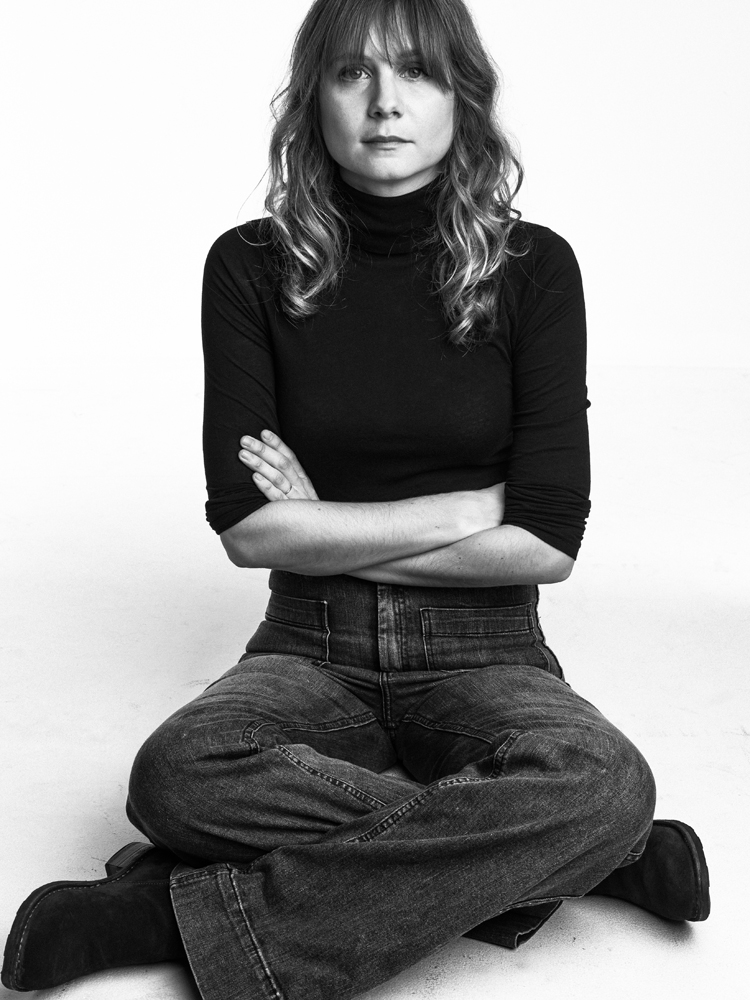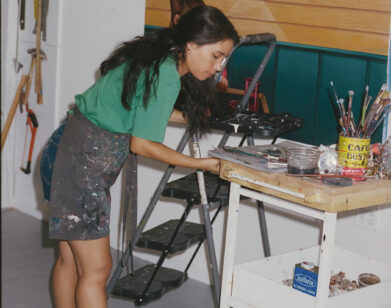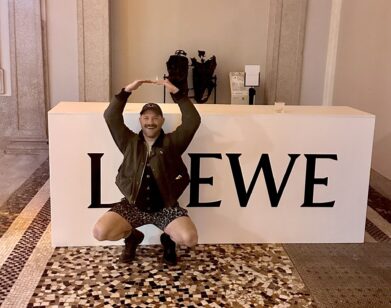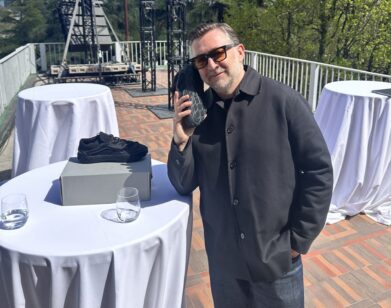Annie Baker
“Do you ever wonder how many times your life is gonna end?” a girl named Lauren asks an older man named Schultz in Annie Baker’s play Circle Mirror Transformation. “Like how many times your life is gonna totally change and then, like, start all over again?”
“Uh … I don’t know,” Schultz says. “I guess I feel like my life is pretty real.”
Lauren responds, “… Yeah.”
Moments such as this—both completely quotidian and slightly surreal—are at the center of Baker’s plays, which take elements of the everyday and infuse them with transcendence. Her plays concern ordinary people (townies, bed-and-breakfast owners) in ordinary places (a community center dance studio, the patio behind a coffee shop) under ordinary circumstances. In their clarity of purpose, characters are elevated to something that can best be described as close to sublime. These characters have earned the 36-year-old playwright a reputation as one of the most searching and original writers working today, whose brilliance lies in her ability to not only capture the way we speak and move through the world—in all our messy incoherence—but make it exhilarating for this very reason.
Baker grew up in Amherst, Massachusetts, and studied dramatic writing at NYU and in the graduate program at Brooklyn College. In 2008, her first play, Body Awareness, was produced Off Broadway; its unsparing realism immediately drew notice from critics who wasted no time in calling Baker a modern-day Chekhov. (This would become a long-standing association.) Five more plays (and an acclaimed adaptation of Uncle Vanya) followed—including 2013’s The Flick, about employees at a small-town movie theater, which won the Pulitzer Prize for Drama. This month, the Signature Theatre in New York will stage the world premiere of her newest play, her seventh, The Antipodes, set in a conference room.
How does she turn the ordinary magical? How does she choose the right words? And how does she make it look so easy? These are among the things Baker discussed with her friend, the actress and filmmaker Greta Gerwig on a recent afternoon in New York.
GRETA GERWIG: What’s strange to me is that I was a fan of your work before I ever met you and became friends with you. You were this faraway person for me, but I felt very close to you through your work
ANNIE BAKER: I had the same thing with you. It’s weird.
GERWIG: This question keeps repeating in my head: Do you choose all the words, or do the words sort of come out, and you’re like, “I guess those are the words.” Like, do you sit there with your pencil and go, “What is the perfect word for this?” Or does it come out of something unconscious?
BAKER: I feel like the reason I ended up becoming a playwright is because I never choose the right word. As a kid, my fantasy profession was to be a novelist. But the thing about writing prose—and maybe great prose writers don’t feel this way—but I always felt it was about choosing words. I was always like, “I have to choose the perfect word.” And then it would kill me, and I would choose the wrong word or I would choose too many perfect words—I wrote really purple prose. I ended up becoming a playwright because you can be grammatically incorrect: people speaking in bad poetry or people attempting to speak well and sometimes succeeding and sometimes failing. The whole imperfection of it suddenly felt freeing to me. So now, while there is a lot of thought and neurosis that goes into what the play is and what the scene will be, when I’m actually writing dialogue, I do feel like it’s completely thoughtless. Even sometimes when there’s a typo I incorporate it. I’m thinking of a line in my new play that I wrote recently. Someone’s like, “It was in the bag of her pickup truck.” I wrote the bag of her pickup truck, and I was like, “Oh, I’ll just have the character say it.” Do you think about the perfect word?
GERWIG: No! I don’t. I remember you mentioned when The Flick got remounted that you had an instinct to futz with it, and then you were like, no. You felt like you weren’t in it anymore.
BAKER: There are certain early plays of mine that I really don’t like, but I can’t imagine going back and fixing them. I would be totally incapable of it. I’m not in the head of the characters anymore.
GERWIG: When you sit down to make a play, do you have the people in them? Or do you think of it as a stage picture? The Flick seemed more like a stage picture idea.
BAKER: Character comes … not last, but second or third or fourth. For early plays of mine, I started with character. But I think that’s because I hadn’t been in theaters; I hadn’t worked that much. I’m very interested in character, obviously, but once I started having my plays produced, I became so fascinated by the theatrical experiment and the weirdness of theatrical space, so now all my plays start with space and stage picture and setting—or container is maybe the better way to put it. I think about the characters a lot, but I’m never like, “I’ll write a play about this character who’s living in my head.” Like with Frances Ha [2013], she was a character that inspired the movie.
GERWIG: I hear voices. I’ll write a bunch of junk where I don’t know how it fits together, but there will be a voice that comes through.
BAKER: That’s interesting. For me, on every project, I realize that I’ve boxed myself into a corner, or that the play necessitates some sort of theatrical convention that I realize I hate while I’m making it. So then the next play is always a rebellion. Or like, the thing I didn’t even realize I was doing last time I will make sure I don’t do this time. But there’s always some other blind spot. And then that blind spot inspires the play that comes after.
GERWIG: I completely agree with that. I write such “talky” things, and I like dialogue, but all I want to do right now is write something with no dialogue and with two characters. I don’t know if I’m really that kind of a writer, but I understand wanting to do that other thing. Where do the characters come from, once you start hearing them?
BAKER: The new play is so weird because it’s nine characters, and they’re pretty much all onstage the whole time. So it’s like a cacophony of voices.
GERWIG: Circle Mirror Transformation had a lot of characters, too.
BAKER: That had five.
GERWIG: Oh, it feels like more.
BAKER: Five is the max I’ve ever had in a play, not counting Uncle Vanya, which is not my play. With all my other plays I wrote … not formal bios, but I had a lot of free-associative prose on my computer about their lives. This play I didn’t. It was just nine people, and it takes place in a workspace. So what you learn about their lives is what they perform for their coworkers. I guess The Flick takes place in a workplace, but there were so many moments where people were like, “This is how I really feel.” This play is all people performing for each other. It’s much more about the surface. I now feel like I know the characters. But it took a while and, like, hundreds of pages of fragments—and, weirdly, casting it. It’s such a huge cast, and it’s so musical, it’s so orchestral, I feel like I couldn’t even really finish writing it until the whole thing was cast. And then, in finishing it, I was writing for specific people’s voices and drawing from them.
GERWIG: I’ve seen all of your plays, but in preparing for this interview, I was reading them, which I hadn’t really done. They’re beautiful and the stage directions are beautiful. I’m specifically thinking about The Flick—one of the directions was something like, “Maybe her dance is something she learned in a Zumba class.” I always feel with screenplays, I am always a little bit sad that people won’t read them. Do you have that feeling with your plays?
BAKER: I’m the opposite. It’s so funny, because the publishing process is weird for me. I’m always sort of in denial that it’s happening, and then years later I’ll open one of my plays and realize that I didn’t spend that much time thinking about the stage direction. Maybe it works on some level because it’s so casual.
GERWIG: Yeah, I like the question marks in it. Like, a lot of the stage directions seemed to be “Maybe it’s this?” And there’s something in the way it sits on the page; it feels like it creates a space for imagining the play. And I think what you’re imagining would be close to what the play actually was.
BAKER: That’s good to know. If I were less lazy, when my play was published, I would go and rewrite everything for the reader. But I don’t do that. What people are reading is just me trying to get the actors and directors to do something or think about something. And I’m always shocked—I meet so many people who have just read my plays and never seen them. When we started dating, I wouldn’t let Nico [Baumbach, Baker’s husband] read my plays. And he’d never seen them either. So for the first two years of dating, he had no idea what I did for work.
GERWIG: So what part of the process are you in with the new play? Are you about to go into rehearsal?
BAKER: We start rehearsals in 13 days.
GERWIG: Is rehearsal process painful for you? Or is it pleasurable?
BAKER: It’s like the most extreme combination of both. I’ve been so in the play, I’ve forgotten that we’re going into rehearsal—and I only go into rehearsal once every two years, max, so it’s very precious. It’s the one six-week period every few years when I’m collaborating with people. But, if I think back to every rehearsal process for every play I’ve ever worked on, there’s just so much crying at home. I barely sleep. There are moments of deep despair and anxiety, and then there are moments in rehearsal that are the most exhilarating; feeling seen and seeing everybody. Feeling like you have a purpose on the planet. A huge part of the process I enjoy is watching the actors figuring out what they can handle and what they can take and what they need from the director and me.
GERWIG: That sounds ideal. Did you have a stage picture in mind for this new play?
BAKER: I did. A conference table surrounded by chairs.
GERWIG: Chairs on wheels?
BAKER: Ergonomic, black chairs on wheels. This is the first play that I wrote to be performed in either thrust or alley seating. Or even potentially in the round. I specifically didn’t write it picturing a proscenium. Every other play I’ve pictured a painting, a diorama-like reality, and this has been interesting because I’m picturing something that is round. It’s people sitting around something, so therefore the audience is also sitting around it.
GERWIG: In Paris Review interviews, they always ask, “What do you write with?” Do you write at a typewriter? At a computer?
BAKER: I write on a computer. I wish I had a cooler answer.
GERWIG: Do you write sitting in a chair? Or do you write lying down? Where’s your body?
BAKER: It depends on the process. In recent months, in the last stages of the play and sort of working on it all the time and being anxious and absorbed in it, I write draped over, like, on the couch or in bed. When I start a new project or I’m doing research, which is always a really long phase, I can’t work from home. I have to be so absorbed in the project to work from home. So I go to a writer’s room where I sit at a little desk. In an ergonomic chair.
GERWIG: What is research for you?
BAKER: Research involves reading a ton of books and taking notes on them. And that’s most of my life, I guess.
GERWIG: How do you direct your reading?
BAKER: The stage picture comes out of the books I was reading, and then leads to more books which leads to more books. I feel with writing, so much of the time, I don’t know how to tap in and be spontaneous and alive on a daily basis. So I don’t write every day. I’m just not disciplined, and I can’t be in the groove most of the time. I feel like I’m in the groove ten days a year or something. But with reading and research, I feel like I have this incredibly instinctive pleasure-driven process that ends up working out for me and inspiring me. It’s almost like a maze, like I know eventually I’ll hit the heart of my play if I read enough books. I feel like my life is at its happiest when I don’t have a looming deadline. There’s some really groovy wonderful times, when I’m like, “I have a new piece, I’m excited about it, I’m reading all these books about it, but there’s not a lot of time pressure, and I’m financially stable enough right now that I don’t have to be trying to get another job.” But that’s so rare.
GERWIG: That’s the best feeling.
BAKER: I’m trying to find that more in my life, because I haven’t had that in a while. I have a lot of shame about it. I’m always saying to myself, “This is so indulgent, you’re so lazy, you should be doing something else.” Retrospectively, I always realize that those were the most productive times, and thank God I didn’t start writing too early. But it’s sort of horrifying to me that I could be a full-time writer, and not actually be, like, working from nine to five.
GERWIG: I’m interested in the feeling of getting to zero after a play, like you’re never going to do it again. That’s a really scary feeling.
BAKER: I never had a lot of ideas. I always have exactly one that is the next project; the idea of a project beyond that project is ludicrous. Right now I think I know what the next play will be. It’s like a very distant star, but I can sort of see it. I still feel like I’ll never write a play again, because it’s so far away and seems so impossible, and I don’t know how you begin a play anymore.
GERWIG: It seems so inevitable in retrospect, what people accomplish. To me, when I look at your career, what you’ve done, it feels like John was inevitable, but that’s not how it felt to you when you finished The Flick.
BAKER: Yeah, exactly.
GERWIG: How does teaching fit into things for you?
BAKER: In a kind of weird way, but in a good way, I think. I teach one semester a year, which is ideal. Because when I was teaching year round, I felt trapped and like I was never in the mode we were just talking about, where it was about me and my work. I’m not saying it’s a service job, but, for me, being a good creative writing teacher is actually kind of being a good therapist. The line is very porous—you can also be a creepy guru/abusive therapist, too, so you have to be very careful. But it feels really important to me. “Give back” feels like such a stupid phrase, but there’s something about it that feels like I’m giving back to the writing community. I like being around people who are like, “What is the point? Should I be doing this? Should I keep doing this? Will anything ever come of this?” And then I’m probably very unhelpful because I’m like, “I don’t know. I don’t know if I should be doing this.”
GERWIG: I like young people. That makes me sound creepy. But, you know, 17 to 28-year-olds I’m very interested in. I’m particularly interested in college students, too, but maybe because that’s when I had my first encounter with someone who said, “You should try to do this.” And they took me seriously, and that was such a big moment.
BAKER: I’ve only taught college students once. For me, it’s like a really depressed 25 or 26-year-old who’s been out of college for three years and nothing has happened and they’ve had a bunch of terrible day jobs but are in a deep sweet spot of sadness and hopelessness. I love those people.
GERWIG: If you make your living doing this—teaching and being a writer—do you ever worry about not having other jobs anymore?
BAKER: Yes, that’s a huge worry, and I feel embarrassed to talk about it because it’s such a privilege, to be like, “Oh, I miss having day jobs.” But they were such incredible fodder for my writing, and I met so many amazing people from all walks of life, and now I hang out with theater and film people. And, obviously, I have family and very close friends who do things that have nothing to do with theater and film, but I don’t constantly meet new people who do something completely different, who have jobs that are completely different than mine. That’s something I tell my students: This period is so useful. Being sad and going out on terrible dates and having horrible breakups and then having a shitty job and then quitting the shitty job and then wondering if you shouldn’t have quit the shitty job and then getting a new shitty job that you get fired off of after six weeks, it’s all so good for your writing. I remember a few years ago was when I was just writing a play and not doing anything else in my life, and I wasn’t cheating on anything with playwriting, and suddenly I was like, “I don’t know if I can do this. I think maybe I have to be cheating on the thing I’m supposed to be doing with playwriting.”
GERWIG: You don’t want the walls to start closing in.
BAKER: I don’t want to write about a playwright. I really don’t want to do that.
GRETA GERWIG IS AN ACTRESS AND FILMMAKER, MOST RECENTLY SEEN IN MIKE MILLS’S 20TH CENTURY WOMEN. THE UPCOMING LADY BIRD WILL BE HER SOLO DIRECTORIAL DEBUT.







